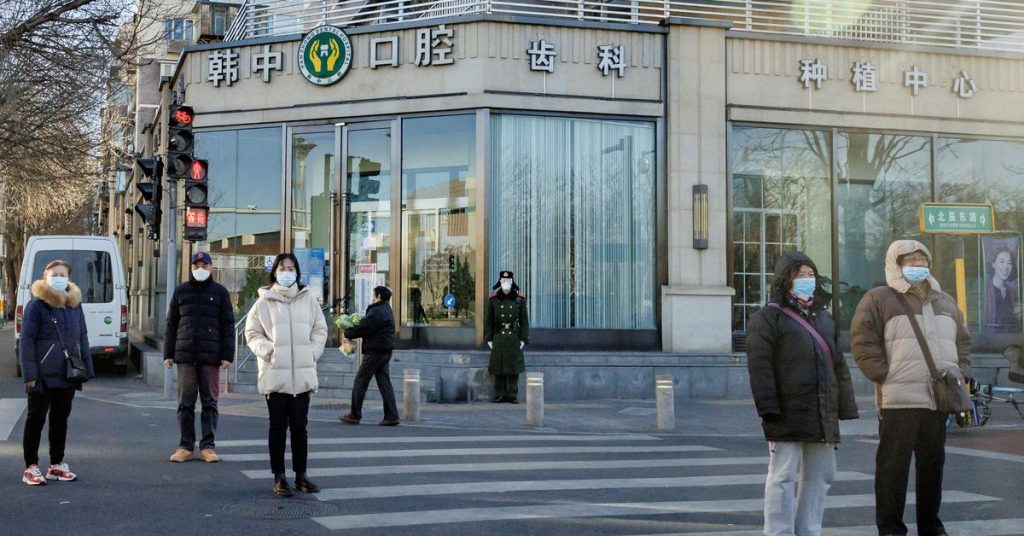
BEIJING (Reuters) – China has softened its tone on the severity of COVID-19 and is easing some coronavirus restrictions even as its daily death toll climbs near record levels, after anger over the world’s toughest restrictions fueled protests across the country.
Several cities in the world’s second-largest economy, while still reporting new infections, are breaking with the practice by lifting district lockdowns and allowing businesses to reopen.
Health authorities announcing the easing of measures did not mention the protests, which ranged from candle-lit vigils in Beijing to clashes with police on the streets of Guangzhou on Tuesday and at an iPhone factory in Zhengzhou last week.
The demonstrations represent the biggest show of civil disobedience in mainland China since President Xi Jinping came to power a decade ago, and come as the economy prepares to enter a new era of growth much slower than seen in decades.
Despite near-record case numbers, Vice Premier Sun Chunlan, who is overseeing the COVID effort, said the virus’s ability to cause disease is weakening, state media reported.
“The country is facing a new situation and new tasks in the field of epidemic prevention and control, as the pathogenicity of the Omicron virus is weakening, and more people are vaccinated and experience in containing the virus is accumulated,” Sun said in remarks reported by state media.
Sun also called for “improving” examination, treatment and quarantine policies.
The mention of low pathogenicity contrasts with previous messages from the authorities about the deadly severity of the virus.
Change rules
Less than 24 hours after violent protests in Guangzhou, authorities in at least seven districts of the sprawling manufacturing hub north of Hong Kong said they had lifted temporary lockdowns. One county said it would allow in-person classes to resume at schools and reopen restaurants and other businesses including movie theaters.
Some changes are implemented with little fanfare.
A community of thousands in eastern Beijing is allowing those with mild symptoms to isolate at home, according to new rules issued by a neighborhood committee and seen by Reuters.
A committee member said that neighbors on the same floor and three floors above and below the home of the positive case should also quarantine at home.
This is a far cry from the quarantine protocols earlier in the year when entire communities were locked down, sometimes for weeks, even after only one positive case was found.
Another nearby community is conducting an online survey this week about the possibility of isolating positive cases at home, residents said.
“I certainly welcome our residential community’s decision to take this vote regardless of the outcome,” said Tom Simpson, managing director for China at the China UK Business Council.
He said his main concern is being forced into a quarantine facility, where “conditions can be grim to say the least.”
Prominent nationalist commentator Hu Xijin said in a social media post on Wednesday that many coronavirus carriers in Beijing are already under home quarantine.
The southwestern Chinese city of Chongqing will allow those infected with the emerging coronavirus, who meet certain conditions, to be quarantined at home, while the central Chinese city of Zhengzhou announced the “orderly” resumption of businesses, including supermarkets, gyms and restaurants.
National health officials said this week that authorities will respond to “urgent concerns” raised by the public and that COVID rules must be implemented more flexibly, depending on the circumstances of the region.
Re-opening next year?
Expectations have grown around the world that China, while still trying to contain infections, may look to reopen sometime next year once it achieves better vaccination rates among the elderly.
Health experts warn of the spread of disease and death if COVID is released before vaccination is ramped up.
Chinese stocks and markets around the world initially fell after the weekend protests in Shanghai, Beijing and other cities, but later recovered in hopes that public pressure would lead to a new approach by the authorities.
The International Monetary Fund said on Wednesday that further outbreaks of the coronavirus could affect Chinese economic activity in the near term, adding that it sees scope for a safe recalibration of policies that may allow economic growth to pick up in 2023.
China’s strict containment measures dampened domestic economic activity this year and spread to other countries through supply chain disruptions.
After downbeat data in an official survey on Wednesday, the global Caixin/S&P manufacturing PMI showed that factory activity contracted in November for the fourth consecutive month. Read more
While the change in tone regarding COVID appears to be a reaction to public discontent with the drastic measures, authorities are also seeking to question those present at the demonstrations.
The China Descent Monitor, which is run by the US government-funded Freedom House, estimated that at least 27 demonstrations took place across China from Saturday to Monday. The Australian ASPI think tank estimated 43 protests in 22 cities.
Additional reporting by Elaine Zhang. Written by Marius Zaharia. Editing by Michael Berry, Robert Purcell
Our standards: Thomson Reuters Trust Principles.

“Travel specialist. Typical social media scholar. Friend of animals everywhere. Freelance zombie ninja. Twitter buff.”





More Stories
Macron rejects left-wing bid to appoint PM before Olympics
Dogs can smell human stress and make decisions accordingly, study says: NPR
Hamas and Fatah sign declaration to form future government as war rages in Gaza